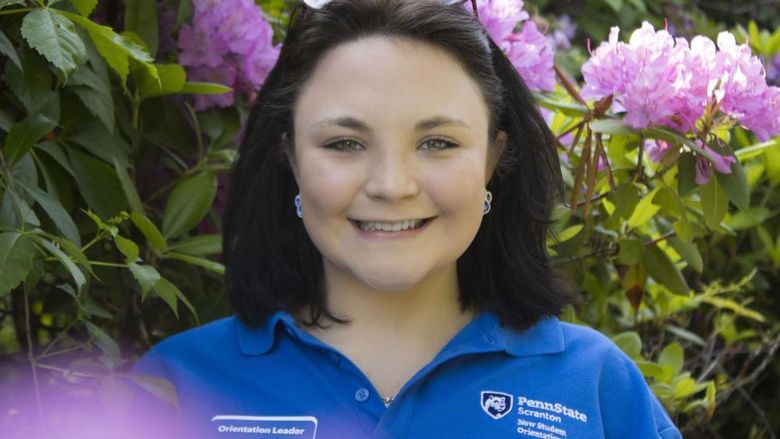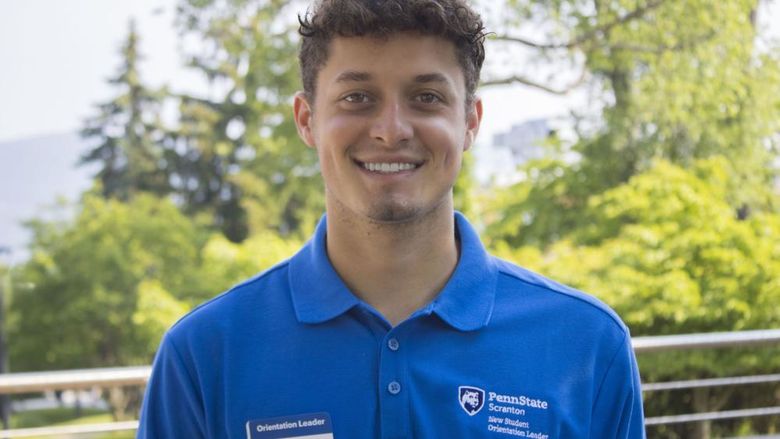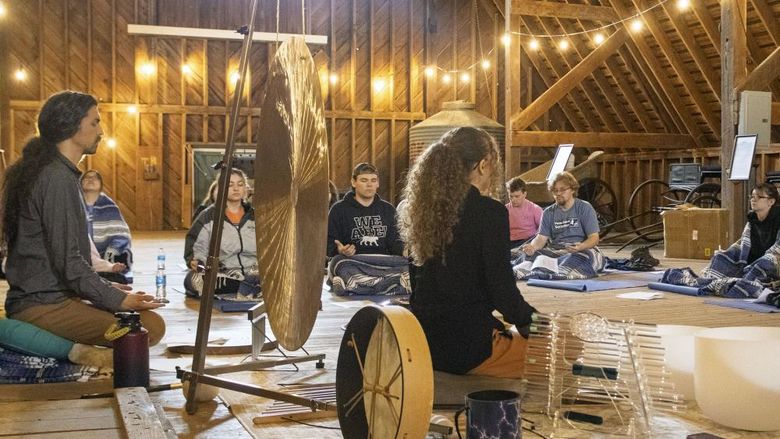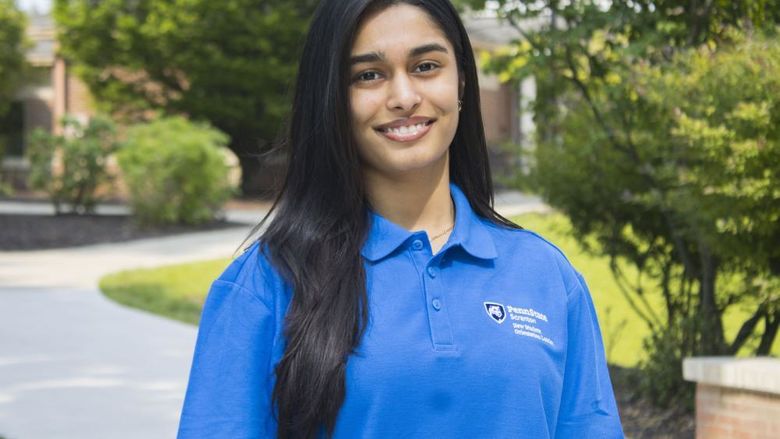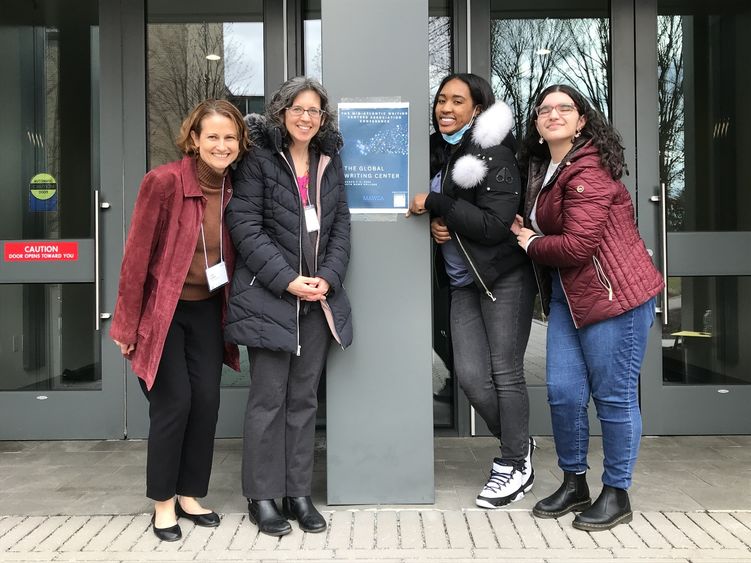
Two Penn State Scranton students who work in the campus' Writing Center as peer tutors attended this year's Mid-Atlantic Writing Conference at Bryn Mawr College. Posing for a photo in front of the conference building are, from left: Assistant Teaching Professor of English Jody Griffith, Writing Center Coordinator Jaime Mosher, second-year nursing student and peer tutor Jemya Wilson, and fourth-year English student Madison Tricarico.
DUNMORE, Pa. — Looking to help further expand the knowledge and skill sets of peer writing tutors at Penn State Scranton, Assistant Teaching Professor of English Jody Griffith and Writing Center Coordinator Jaime Mosher took two of them to the two-day Mid-Atlantic Writing Center Associations (MAWCA) conference at Bryn Mawr College earlier this semester.
This year was the first time the conference has been held in person since the COVID-19 pandemic and also the first time student peer writing tutors from the campus’ Writing Center had attended as well.
Griffith, the campus’ composition coordinator, has been involved with MAWCA ever since she started teaching at Penn State Scranton.
“My first time attending the MAWCA conference was in 2019, before we had any peer writing tutors working in our center,” she said. “Seeing that other colleges had brought big groups of peer writing tutors along made me hope that we’d be able to do the same soon.”
Griffith described to Mosher how valuable her experiences were of attending the MAWCA conference and decided to open it up to the Writing Center’s peer writing tutors.
Mosher was no stranger to the MAWCA conference either, as she was first introduced when she worked as a writing tutor as an undergraduate student but had never been able to attend.
“I also noticed that other campuses brought their peer writing tutors, so when we first started receiving emails about this year’s conference, we planned to attend with the hope of bringing some of our peer writing tutors,” Mosher explained.
Peer writing tutors are trained to help
Madison Tricarico, a fourth-year English major, and Jemya Wilson, a second-year nursing student, are peer writing tutors at the Writing Center and were the two peer tutors who joined Griffith and Mosher at this year’s MAWCA conference.
Tricarico and Wilson became involved in the Writing Center after being recommended by faculty members to become peer writing tutors, and both have noted their enjoyment of helping their peers with writing assignments and research papers.
“I have always loved helping people in absolutely any way that I could,” said Tricarico. “So, when given the opportunity to take a class to be able to spend my extra time working with students to aid them in furthering their own writing, I was so excited to begin.”
Wilson feels the same.
“I always thought any type of tutoring offered through school was through professionals, such as professors or people hired in. I would have never thought I would become a tutor myself for Penn State Scranton,” she said. “I enjoy helping people and seeing students succeed in their courses, specifically in their writing courses. Additionally, I enjoy reading students' papers, whether it is a fictional story or a research paper, they are all interesting.”
In order to become a peer writing tutor, students must complete English 250 — a peer tutoring training course to become a qualified tutor.
The Writing Center and beyond
Tricarico, who has plans of continuing her education through a master’s degree in secondary education with a focus on English and special education, said that being involved as a peer writing tutor has prepared her for what the world of teaching might be like.
“It has taught me patience and understanding along with the knowledge of how to help a student go through and edit their own papers versus the way I might try to edit my own,” Tricarico said.
Wilson also feels that peer tutoring has helped her grow as a student and young professional by learning how to interact with people other than her friends.
“I enjoy reading and writing, I also enjoy my job as a peer writing tutor. I love the whole concept of the Writing Center and overall, the whole Learning Center,” Wilson said. “It shows that Penn State Scranton wants their students to succeed, and they are giving them the tools to do so. I deemed attending the conference an opportunity for me to see other universities' writing centers and how they contribute to their students, to see if anything can be incorporated here.”
Being a peer writing tutor and attending the MAWCA Conference helped Tricarico step out of her comfort zone.
“One thing that I have been trying to do more is making myself step out of my comfort zone, do things that I might not always jump feet first into,” Tricarico said. “With this being my last semester at Penn State Scranton, I wanted to try as many events and activities as I could, ones that I didn’t get to try due to my own shyness or due to COVID.”
Griffith and Mosher were both thrilled when they found out Tricarico and Wilson could join them.
Learning about accessibility and inclusiveness when working with multilingual and neurodivergent writers
There was a wide variety of sessions offered at this year’s conference, including workshops, panels, roundtable discussions and individual presentations.
More specifically, the MAWCA conference provided students, faculty and staff the opportunity to learn more about accessibility and inclusiveness, particularly when working with multilingual and neurodivergent writers, which was a main takeaway by all who attended.
Mosher explained that the four of them split up to cover as many sessions as possible.
Griffith said that since she teaches the course for training the campus’ peer writing tutors, she focused more on sessions that related to skills and ideas that would be helpful for that training.
Wilson attended sessions that focused more on multilingual students, while Tricarico concentrated on accessibility sessions.
“For example, I went to a presentation at the conference where the rule was to raise both hands at the same time if we had a question, needed to answer a question, or needed help with something,” Wilson explained. “We are all used to raising one hand when in a classroom setting. Nobody ended up raising both hands because they either forgot, they were uncomfortable doing so, or they saw no one else doing it. The presenter said that this is what happens with translingual students when writing. Our campus has a lot of bilingual students so I will always keep that in mind when doing my job and have even more patience with them knowing what I know now.”
Tricarico also learned some helpful tips at the conference that she believes would be an aid to our students on campus.
“One takeaway that I was trying to look for while at this conference were ways to expand the Writing Center in order to make it more accessible and helpful for students,” she said. “Some of the ones that were listed had fidget toys available or even breaks for students to walk around or stretch during meetings in order to help prevent restlessness. Or there was the aspect of sensory issues, and maybe trying to make there be more areas where there would be less noise or less bright lights.”
After attending this conference, Tricarico said that she plans to offer and integrate breaks within a tutoring session, to give herself and peers the opportunity to prevent burnout before the end of their meeting sessions.
Meeting peer writing tutors from other campuses
Tricarico and Wilson both said that getting to meet peer writing tutors from other colleges and universities, explore Bryn Mawr’s Writing Center, and joining Griffith and Mosher at the two-day conference were their favorite experiences.
Griffith and Mosher explained the importance of getting to meet fellow student peer writing tutors at other campuses to expand their knowledge and skill sets when working with students at Penn State Scranton.
“It’s important for them to have the chance to meet others and discuss ideas with students at other campuses who are in the same position as they are. It’s also important for them to hear about the research that is being done so they can continue to refine their craft to better serve the students at Penn State Scranton,” Mosher said. “Going to conferences like this helps us to think more strategically about what we are doing, how and why we are doing it, and how we can improve as a center.”
“I think it’s really helpful and fun for our students to meet fellow peer tutors from all around the region. We met students from a wide variety of Writing Centers, all with interesting and creative ways of supporting the writers on their campuses,” Griffith said. “It’s also a very friendly and welcoming conference, with special events and programs for peer tutors.”
Griffith and Mosher hope that Tricarico and Wilson gain a bigger picture of what a Writing Center can be and a renewed sense of excitement about what Penn State Scranton’s Writing Center can do.
"I hope it made our students feel empowered to improve and grow our center. In the future, I hope our students can bring this sense of excitement about contributing and problem solving in whatever professional path they pursue,” said Griffith.
“Our center is relatively young compared to many others that have been established for decades. I want them to see the possibilities and be innovative in terms of thinking about ways we can reach our goals, expand our services, and meet the needs of the students on our campus,” Mosher said.
“Also, attending a conference like this is a great opportunity to build their soft skills in a professional setting. Additionally, much of the content learned in the sessions can be applied to any career, as it focuses on valuing the perspectives of others and helping them to overcome any barriers that may be hindering their progress.”
Griffith hopes to be able to continue to bring peer writing tutors to the annual MAWCA conference in the future.
“Perhaps some of our students will even want to give presentations,” Griffith said.
Advice from the tutors
“I think it is important for fellow students and classmates to attend conferences such as MAWCA to expand and enhance their knowledge and understanding because points made throughout the conference were things you can use for a lifetime, teach others and spread that knowledge yourself,” Wilson said.
“Always try new things if you are given the opportunity to. The chance to expand your horizons through trips or conferences is one of the highlights of college, so take it while you can,” Tricarico added. “Not only will it help to aid the area in which the conference is about, but it will help you become a more rounded person in the meantime. Plus, they’re fun. It’s so much fun to go and learn about a topic you adore while also getting to meet other people who feel just the same.”
In addition to the annual conference, MAWCA offers a multitude of trainings and resources for faculty and students who work in Writing Centers. Want to learn more about peer tutoring? Visit the Learning and Writing Center for additional resources.

